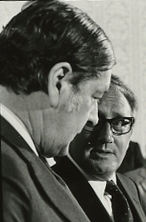Speech to the UN General Assembly (5 October 1976).
Anthony Crosland: Frases en inglés
The Future of Socialism by Anthony Crosland.
The Future of Socialism (1956)
Speech in the House of Commons (Hansard, 6 November 1974, Cols. 1076–7).
Letter published in Tribune (1976).
"The Future of Socialism" (Jonathan Cape, 1956) p. 149.
The remark about 'detached residences in Bournemouth' refers to an article in catholic newspaper The Tablet http://archive.thetablet.co.uk/article/31st-may-1952/4/the-old-fabians-and-the-new titled "The Old Fabians and the New" (31 May 1952, p. 4) in which Roy Jenkins is presumed to be seeking to deprive their residents of their capital.
The Future of Socialism by Anthony Crosland.
The Future of Socialism (1956)
The Future of Socialism by Anthony Crosland.
The Future of Socialism (1956)
Speech in Rotherham (9 June 1973).
The Future of Socialism by Anthony Crosland.
The Future of Socialism (1956)
'Class hypocrisy of the conservationists', The Times (8 January 1971), p. 10
An extract from the Fabian pamphlet A Social Democratic Britain.
The Future of Socialism by Anthony Crosland
The Future of Socialism (1956)
Speech in Manchester Town Hall (9 May 1975), quoted in Christopher Warman, 'Councils are told to curb rise in spending', The Times (10 May 1975), p. 1
Anthony Crosland, Socialism Now (Jonathan Cape, 1974), p. 44
“I am…wholeheartedly a Galbraith man.”
Anthony Crosland, The Conservative Enemy (Jonathan Cape, 1962), p. 103.
“I do not believe there is a long-term future for the privately rented sector in its present form.”
Speech in Eastbourne (20 November 1975).
The Times (8 September 1977).
'The Transition from Capitalism' in Richard Crossman (ed.), New Fabian Essays (Turnstile Press, 1952), pp. 39–40
